Impact of Cross-Border Banking on EU-UK Free Trade Agreement (1990-2018)
VerifiedAdded on 2023/06/08
|9
|3229
|227
AI Summary
This report analyzes the impact of cross-border banking on the EU-UK free trade agreement between 1990-2018. It discusses the literature review of free trade agreement and cross-border banking, evaluates the impact of cross-border banking on block members of EU-UK FTA, and assesses the relationship between EU and UK FTA and cross-border banking. The report concludes with a future outlook on cross-border banking and FTA (EU and UK).
Contribute Materials
Your contribution can guide someone’s learning journey. Share your
documents today.
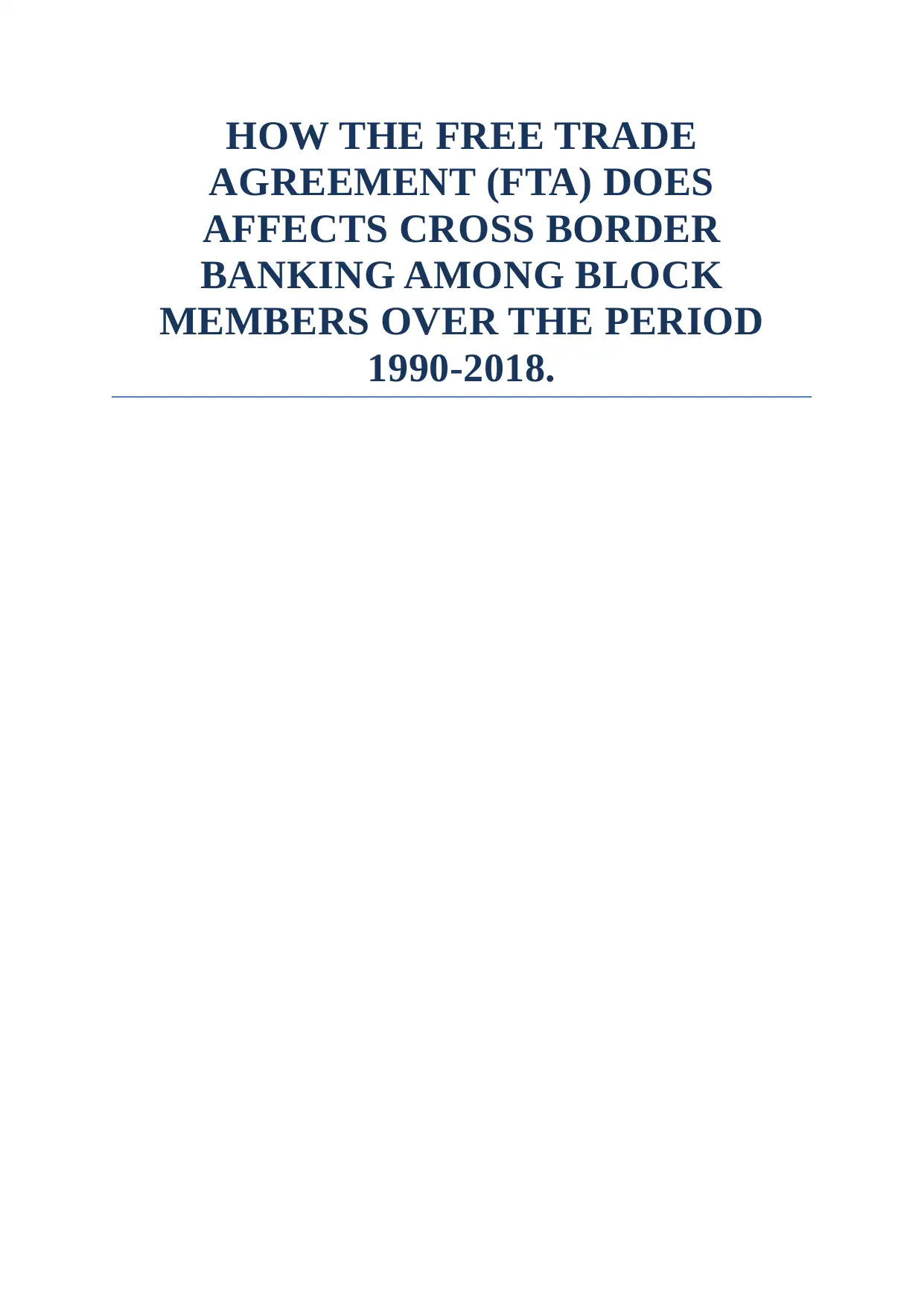
HOW THE FREE TRADE
AGREEMENT (FTA) DOES
AFFECTS CROSS BORDER
BANKING AMONG BLOCK
MEMBERS OVER THE PERIOD
1990-2018.
AGREEMENT (FTA) DOES
AFFECTS CROSS BORDER
BANKING AMONG BLOCK
MEMBERS OVER THE PERIOD
1990-2018.
Secure Best Marks with AI Grader
Need help grading? Try our AI Grader for instant feedback on your assignments.
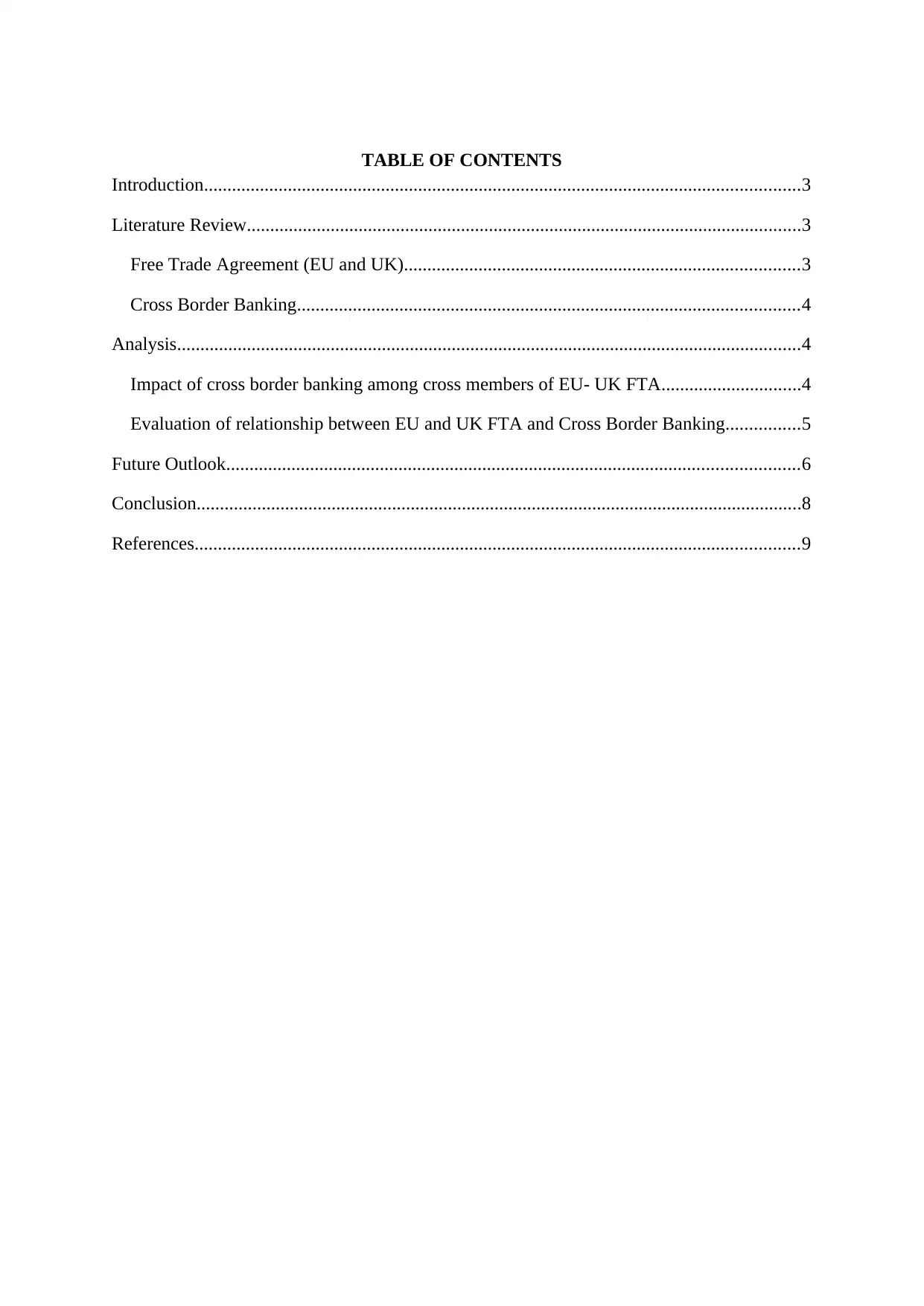
TABLE OF CONTENTS
Introduction................................................................................................................................3
Literature Review.......................................................................................................................3
Free Trade Agreement (EU and UK).....................................................................................3
Cross Border Banking............................................................................................................4
Analysis......................................................................................................................................4
Impact of cross border banking among cross members of EU- UK FTA..............................4
Evaluation of relationship between EU and UK FTA and Cross Border Banking................5
Future Outlook...........................................................................................................................6
Conclusion..................................................................................................................................8
References..................................................................................................................................9
Introduction................................................................................................................................3
Literature Review.......................................................................................................................3
Free Trade Agreement (EU and UK).....................................................................................3
Cross Border Banking............................................................................................................4
Analysis......................................................................................................................................4
Impact of cross border banking among cross members of EU- UK FTA..............................4
Evaluation of relationship between EU and UK FTA and Cross Border Banking................5
Future Outlook...........................................................................................................................6
Conclusion..................................................................................................................................8
References..................................................................................................................................9
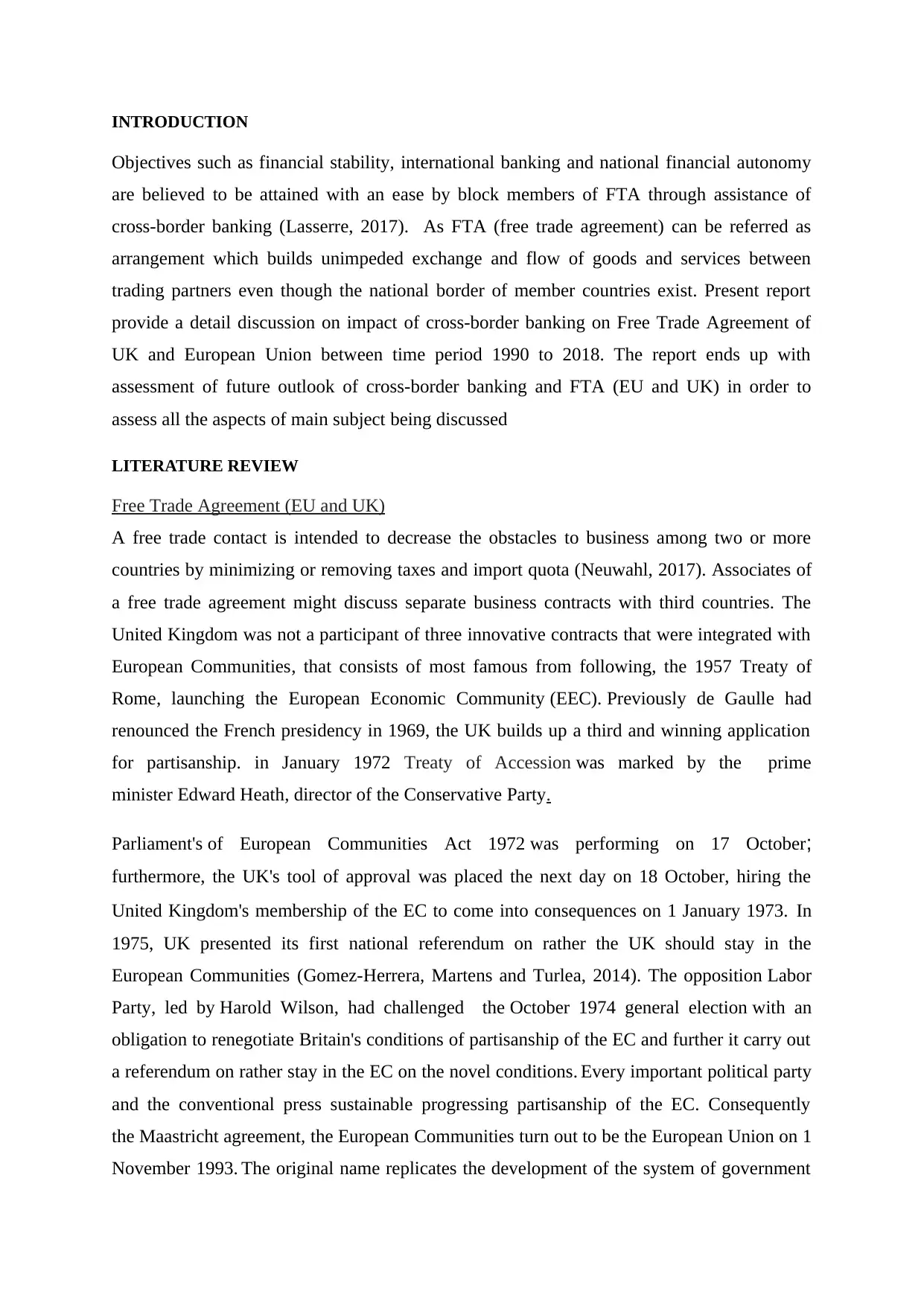
INTRODUCTION
Objectives such as financial stability, international banking and national financial autonomy
are believed to be attained with an ease by block members of FTA through assistance of
cross-border banking (Lasserre, 2017). As FTA (free trade agreement) can be referred as
arrangement which builds unimpeded exchange and flow of goods and services between
trading partners even though the national border of member countries exist. Present report
provide a detail discussion on impact of cross-border banking on Free Trade Agreement of
UK and European Union between time period 1990 to 2018. The report ends up with
assessment of future outlook of cross-border banking and FTA (EU and UK) in order to
assess all the aspects of main subject being discussed
LITERATURE REVIEW
Free Trade Agreement (EU and UK)
A free trade contact is intended to decrease the obstacles to business among two or more
countries by minimizing or removing taxes and import quota (Neuwahl, 2017). Associates of
a free trade agreement might discuss separate business contracts with third countries. The
United Kingdom was not a participant of three innovative contracts that were integrated with
European Communities, that consists of most famous from following, the 1957 Treaty of
Rome, launching the European Economic Community (EEC). Previously de Gaulle had
renounced the French presidency in 1969, the UK builds up a third and winning application
for partisanship. in January 1972 Treaty of Accession was marked by the prime
minister Edward Heath, director of the Conservative Party.
Parliament's of European Communities Act 1972 was performing on 17 October;
furthermore, the UK's tool of approval was placed the next day on 18 October, hiring the
United Kingdom's membership of the EC to come into consequences on 1 January 1973. In
1975, UK presented its first national referendum on rather the UK should stay in the
European Communities (Gomez-Herrera, Martens and Turlea, 2014). The opposition Labor
Party, led by Harold Wilson, had challenged the October 1974 general election with an
obligation to renegotiate Britain's conditions of partisanship of the EC and further it carry out
a referendum on rather stay in the EC on the novel conditions. Every important political party
and the conventional press sustainable progressing partisanship of the EC. Consequently
the Maastricht agreement, the European Communities turn out to be the European Union on 1
November 1993. The original name replicates the development of the system of government
Objectives such as financial stability, international banking and national financial autonomy
are believed to be attained with an ease by block members of FTA through assistance of
cross-border banking (Lasserre, 2017). As FTA (free trade agreement) can be referred as
arrangement which builds unimpeded exchange and flow of goods and services between
trading partners even though the national border of member countries exist. Present report
provide a detail discussion on impact of cross-border banking on Free Trade Agreement of
UK and European Union between time period 1990 to 2018. The report ends up with
assessment of future outlook of cross-border banking and FTA (EU and UK) in order to
assess all the aspects of main subject being discussed
LITERATURE REVIEW
Free Trade Agreement (EU and UK)
A free trade contact is intended to decrease the obstacles to business among two or more
countries by minimizing or removing taxes and import quota (Neuwahl, 2017). Associates of
a free trade agreement might discuss separate business contracts with third countries. The
United Kingdom was not a participant of three innovative contracts that were integrated with
European Communities, that consists of most famous from following, the 1957 Treaty of
Rome, launching the European Economic Community (EEC). Previously de Gaulle had
renounced the French presidency in 1969, the UK builds up a third and winning application
for partisanship. in January 1972 Treaty of Accession was marked by the prime
minister Edward Heath, director of the Conservative Party.
Parliament's of European Communities Act 1972 was performing on 17 October;
furthermore, the UK's tool of approval was placed the next day on 18 October, hiring the
United Kingdom's membership of the EC to come into consequences on 1 January 1973. In
1975, UK presented its first national referendum on rather the UK should stay in the
European Communities (Gomez-Herrera, Martens and Turlea, 2014). The opposition Labor
Party, led by Harold Wilson, had challenged the October 1974 general election with an
obligation to renegotiate Britain's conditions of partisanship of the EC and further it carry out
a referendum on rather stay in the EC on the novel conditions. Every important political party
and the conventional press sustainable progressing partisanship of the EC. Consequently
the Maastricht agreement, the European Communities turn out to be the European Union on 1
November 1993. The original name replicates the development of the system of government
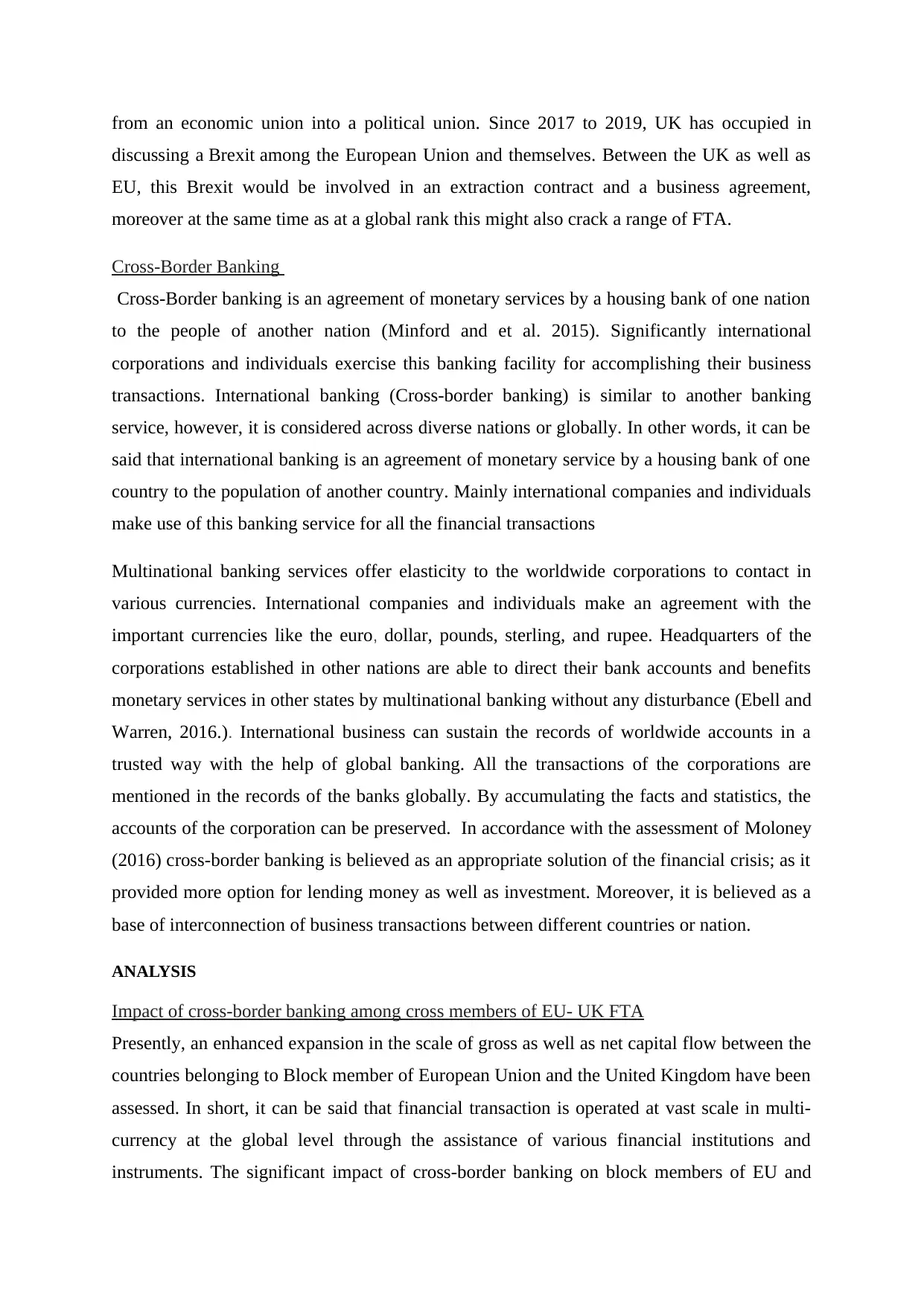
from an economic union into a political union. Since 2017 to 2019, UK has occupied in
discussing a Brexit among the European Union and themselves. Between the UK as well as
EU, this Brexit would be involved in an extraction contract and a business agreement,
moreover at the same time as at a global rank this might also crack a range of FTA.
Cross-Border Banking
Cross-Border banking is an agreement of monetary services by a housing bank of one nation
to the people of another nation (Minford and et al. 2015). Significantly international
corporations and individuals exercise this banking facility for accomplishing their business
transactions. International banking (Cross-border banking) is similar to another banking
service, however, it is considered across diverse nations or globally. In other words, it can be
said that international banking is an agreement of monetary service by a housing bank of one
country to the population of another country. Mainly international companies and individuals
make use of this banking service for all the financial transactions
Multinational banking services offer elasticity to the worldwide corporations to contact in
various currencies. International companies and individuals make an agreement with the
important currencies like the euro, dollar, pounds, sterling, and rupee. Headquarters of the
corporations established in other nations are able to direct their bank accounts and benefits
monetary services in other states by multinational banking without any disturbance (Ebell and
Warren, 2016.). International business can sustain the records of worldwide accounts in a
trusted way with the help of global banking. All the transactions of the corporations are
mentioned in the records of the banks globally. By accumulating the facts and statistics, the
accounts of the corporation can be preserved. In accordance with the assessment of Moloney
(2016) cross-border banking is believed as an appropriate solution of the financial crisis; as it
provided more option for lending money as well as investment. Moreover, it is believed as a
base of interconnection of business transactions between different countries or nation.
ANALYSIS
Impact of cross-border banking among cross members of EU- UK FTA
Presently, an enhanced expansion in the scale of gross as well as net capital flow between the
countries belonging to Block member of European Union and the United Kingdom have been
assessed. In short, it can be said that financial transaction is operated at vast scale in multi-
currency at the global level through the assistance of various financial institutions and
instruments. The significant impact of cross-border banking on block members of EU and
discussing a Brexit among the European Union and themselves. Between the UK as well as
EU, this Brexit would be involved in an extraction contract and a business agreement,
moreover at the same time as at a global rank this might also crack a range of FTA.
Cross-Border Banking
Cross-Border banking is an agreement of monetary services by a housing bank of one nation
to the people of another nation (Minford and et al. 2015). Significantly international
corporations and individuals exercise this banking facility for accomplishing their business
transactions. International banking (Cross-border banking) is similar to another banking
service, however, it is considered across diverse nations or globally. In other words, it can be
said that international banking is an agreement of monetary service by a housing bank of one
country to the population of another country. Mainly international companies and individuals
make use of this banking service for all the financial transactions
Multinational banking services offer elasticity to the worldwide corporations to contact in
various currencies. International companies and individuals make an agreement with the
important currencies like the euro, dollar, pounds, sterling, and rupee. Headquarters of the
corporations established in other nations are able to direct their bank accounts and benefits
monetary services in other states by multinational banking without any disturbance (Ebell and
Warren, 2016.). International business can sustain the records of worldwide accounts in a
trusted way with the help of global banking. All the transactions of the corporations are
mentioned in the records of the banks globally. By accumulating the facts and statistics, the
accounts of the corporation can be preserved. In accordance with the assessment of Moloney
(2016) cross-border banking is believed as an appropriate solution of the financial crisis; as it
provided more option for lending money as well as investment. Moreover, it is believed as a
base of interconnection of business transactions between different countries or nation.
ANALYSIS
Impact of cross-border banking among cross members of EU- UK FTA
Presently, an enhanced expansion in the scale of gross as well as net capital flow between the
countries belonging to Block member of European Union and the United Kingdom have been
assessed. In short, it can be said that financial transaction is operated at vast scale in multi-
currency at the global level through the assistance of various financial institutions and
instruments. The significant impact of cross-border banking on block members of EU and
Secure Best Marks with AI Grader
Need help grading? Try our AI Grader for instant feedback on your assignments.
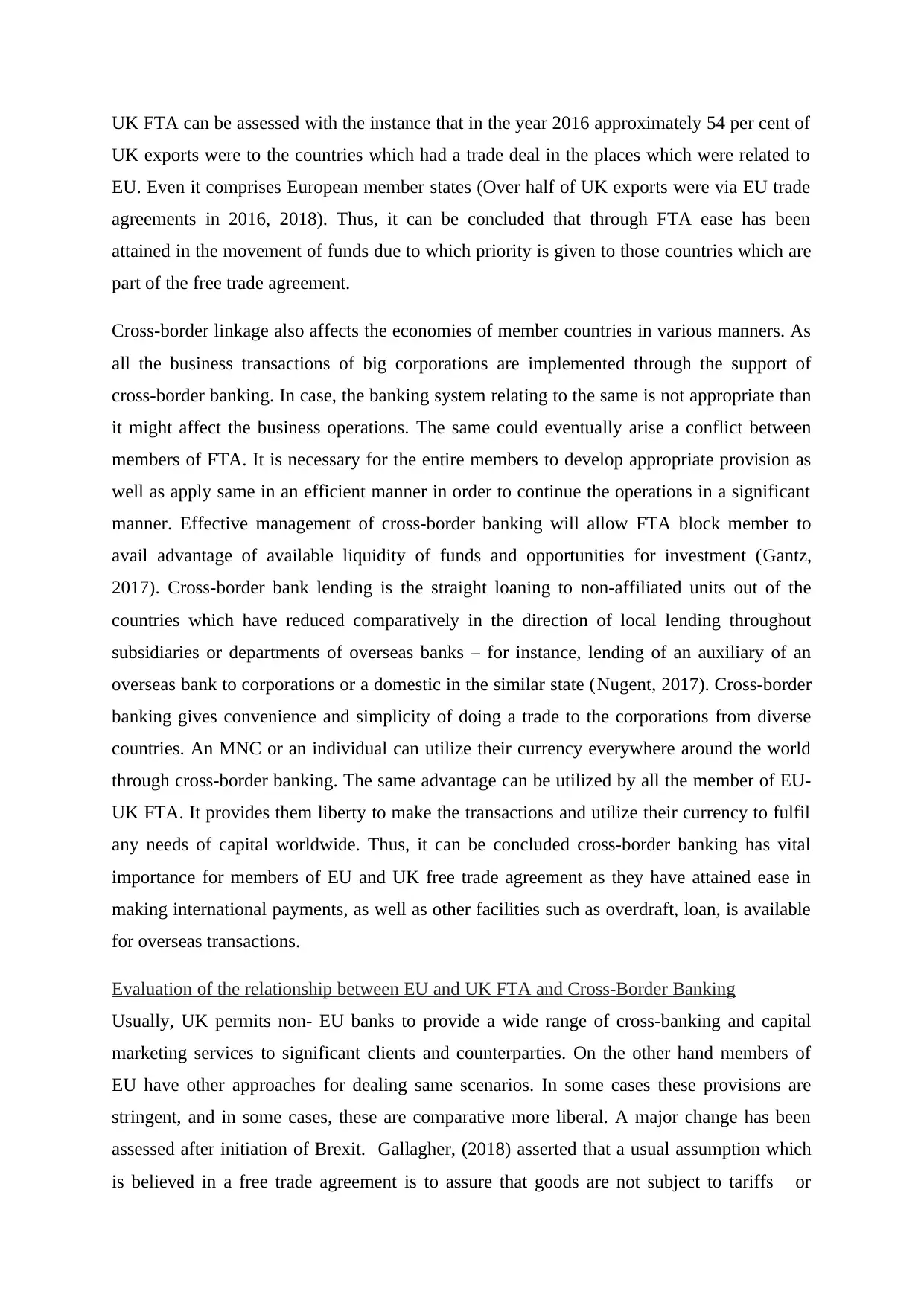
UK FTA can be assessed with the instance that in the year 2016 approximately 54 per cent of
UK exports were to the countries which had a trade deal in the places which were related to
EU. Even it comprises European member states (Over half of UK exports were via EU trade
agreements in 2016, 2018). Thus, it can be concluded that through FTA ease has been
attained in the movement of funds due to which priority is given to those countries which are
part of the free trade agreement.
Cross-border linkage also affects the economies of member countries in various manners. As
all the business transactions of big corporations are implemented through the support of
cross-border banking. In case, the banking system relating to the same is not appropriate than
it might affect the business operations. The same could eventually arise a conflict between
members of FTA. It is necessary for the entire members to develop appropriate provision as
well as apply same in an efficient manner in order to continue the operations in a significant
manner. Effective management of cross-border banking will allow FTA block member to
avail advantage of available liquidity of funds and opportunities for investment (Gantz,
2017). Cross-border bank lending is the straight loaning to non-affiliated units out of the
countries which have reduced comparatively in the direction of local lending throughout
subsidiaries or departments of overseas banks – for instance, lending of an auxiliary of an
overseas bank to corporations or a domestic in the similar state (Nugent, 2017). Cross-border
banking gives convenience and simplicity of doing a trade to the corporations from diverse
countries. An MNC or an individual can utilize their currency everywhere around the world
through cross-border banking. The same advantage can be utilized by all the member of EU-
UK FTA. It provides them liberty to make the transactions and utilize their currency to fulfil
any needs of capital worldwide. Thus, it can be concluded cross-border banking has vital
importance for members of EU and UK free trade agreement as they have attained ease in
making international payments, as well as other facilities such as overdraft, loan, is available
for overseas transactions.
Evaluation of the relationship between EU and UK FTA and Cross-Border Banking
Usually, UK permits non- EU banks to provide a wide range of cross-banking and capital
marketing services to significant clients and counterparties. On the other hand members of
EU have other approaches for dealing same scenarios. In some cases these provisions are
stringent, and in some cases, these are comparative more liberal. A major change has been
assessed after initiation of Brexit. Gallagher, (2018) asserted that a usual assumption which
is believed in a free trade agreement is to assure that goods are not subject to tariffs or
UK exports were to the countries which had a trade deal in the places which were related to
EU. Even it comprises European member states (Over half of UK exports were via EU trade
agreements in 2016, 2018). Thus, it can be concluded that through FTA ease has been
attained in the movement of funds due to which priority is given to those countries which are
part of the free trade agreement.
Cross-border linkage also affects the economies of member countries in various manners. As
all the business transactions of big corporations are implemented through the support of
cross-border banking. In case, the banking system relating to the same is not appropriate than
it might affect the business operations. The same could eventually arise a conflict between
members of FTA. It is necessary for the entire members to develop appropriate provision as
well as apply same in an efficient manner in order to continue the operations in a significant
manner. Effective management of cross-border banking will allow FTA block member to
avail advantage of available liquidity of funds and opportunities for investment (Gantz,
2017). Cross-border bank lending is the straight loaning to non-affiliated units out of the
countries which have reduced comparatively in the direction of local lending throughout
subsidiaries or departments of overseas banks – for instance, lending of an auxiliary of an
overseas bank to corporations or a domestic in the similar state (Nugent, 2017). Cross-border
banking gives convenience and simplicity of doing a trade to the corporations from diverse
countries. An MNC or an individual can utilize their currency everywhere around the world
through cross-border banking. The same advantage can be utilized by all the member of EU-
UK FTA. It provides them liberty to make the transactions and utilize their currency to fulfil
any needs of capital worldwide. Thus, it can be concluded cross-border banking has vital
importance for members of EU and UK free trade agreement as they have attained ease in
making international payments, as well as other facilities such as overdraft, loan, is available
for overseas transactions.
Evaluation of the relationship between EU and UK FTA and Cross-Border Banking
Usually, UK permits non- EU banks to provide a wide range of cross-banking and capital
marketing services to significant clients and counterparties. On the other hand members of
EU have other approaches for dealing same scenarios. In some cases these provisions are
stringent, and in some cases, these are comparative more liberal. A major change has been
assessed after initiation of Brexit. Gallagher, (2018) asserted that a usual assumption which
is believed in a free trade agreement is to assure that goods are not subject to tariffs or
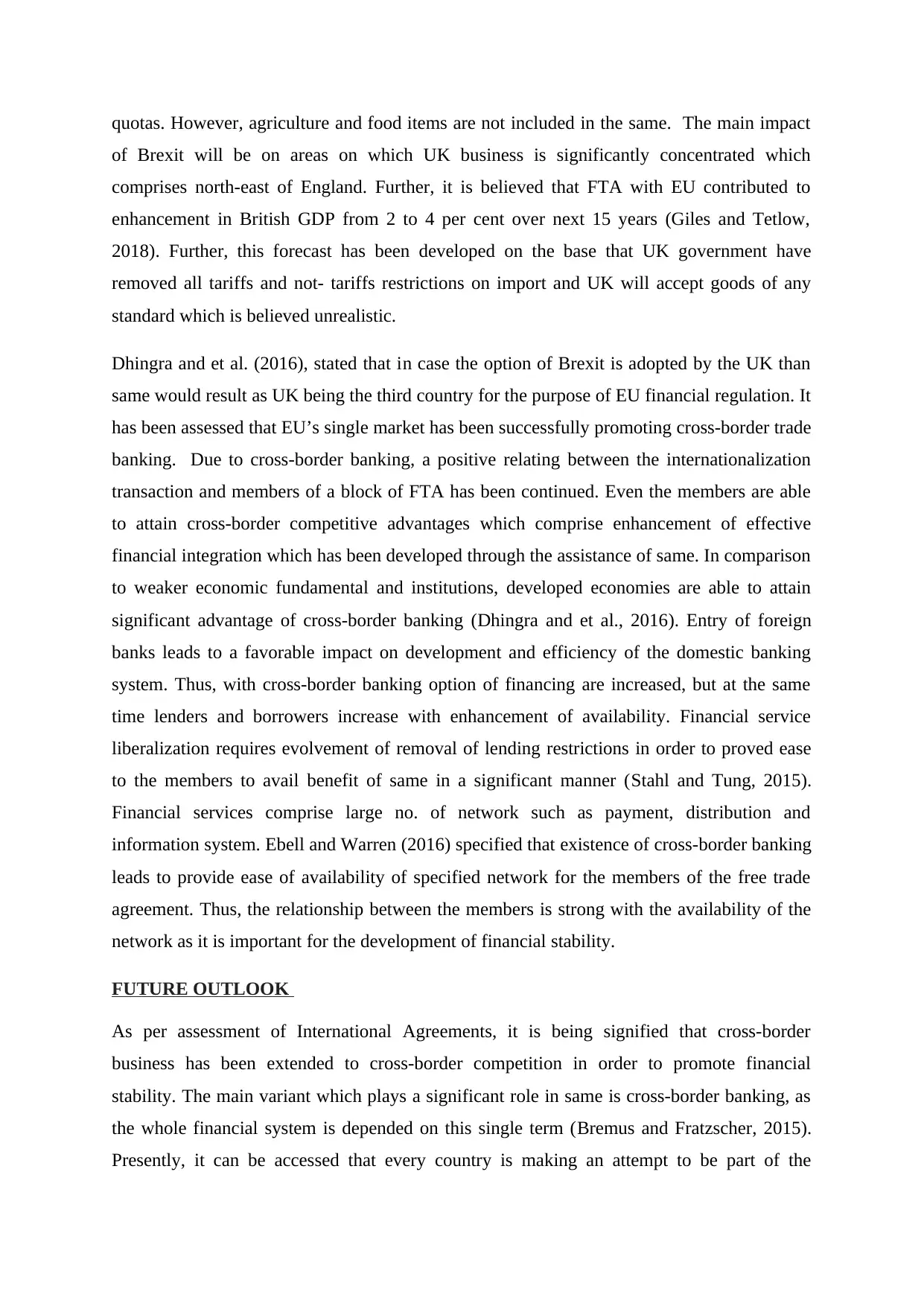
quotas. However, agriculture and food items are not included in the same. The main impact
of Brexit will be on areas on which UK business is significantly concentrated which
comprises north-east of England. Further, it is believed that FTA with EU contributed to
enhancement in British GDP from 2 to 4 per cent over next 15 years (Giles and Tetlow,
2018). Further, this forecast has been developed on the base that UK government have
removed all tariffs and not- tariffs restrictions on import and UK will accept goods of any
standard which is believed unrealistic.
Dhingra and et al. (2016), stated that in case the option of Brexit is adopted by the UK than
same would result as UK being the third country for the purpose of EU financial regulation. It
has been assessed that EU’s single market has been successfully promoting cross-border trade
banking. Due to cross-border banking, a positive relating between the internationalization
transaction and members of a block of FTA has been continued. Even the members are able
to attain cross-border competitive advantages which comprise enhancement of effective
financial integration which has been developed through the assistance of same. In comparison
to weaker economic fundamental and institutions, developed economies are able to attain
significant advantage of cross-border banking (Dhingra and et al., 2016). Entry of foreign
banks leads to a favorable impact on development and efficiency of the domestic banking
system. Thus, with cross-border banking option of financing are increased, but at the same
time lenders and borrowers increase with enhancement of availability. Financial service
liberalization requires evolvement of removal of lending restrictions in order to proved ease
to the members to avail benefit of same in a significant manner (Stahl and Tung, 2015).
Financial services comprise large no. of network such as payment, distribution and
information system. Ebell and Warren (2016) specified that existence of cross-border banking
leads to provide ease of availability of specified network for the members of the free trade
agreement. Thus, the relationship between the members is strong with the availability of the
network as it is important for the development of financial stability.
FUTURE OUTLOOK
As per assessment of International Agreements, it is being signified that cross-border
business has been extended to cross-border competition in order to promote financial
stability. The main variant which plays a significant role in same is cross-border banking, as
the whole financial system is depended on this single term (Bremus and Fratzscher, 2015).
Presently, it can be accessed that every country is making an attempt to be part of the
of Brexit will be on areas on which UK business is significantly concentrated which
comprises north-east of England. Further, it is believed that FTA with EU contributed to
enhancement in British GDP from 2 to 4 per cent over next 15 years (Giles and Tetlow,
2018). Further, this forecast has been developed on the base that UK government have
removed all tariffs and not- tariffs restrictions on import and UK will accept goods of any
standard which is believed unrealistic.
Dhingra and et al. (2016), stated that in case the option of Brexit is adopted by the UK than
same would result as UK being the third country for the purpose of EU financial regulation. It
has been assessed that EU’s single market has been successfully promoting cross-border trade
banking. Due to cross-border banking, a positive relating between the internationalization
transaction and members of a block of FTA has been continued. Even the members are able
to attain cross-border competitive advantages which comprise enhancement of effective
financial integration which has been developed through the assistance of same. In comparison
to weaker economic fundamental and institutions, developed economies are able to attain
significant advantage of cross-border banking (Dhingra and et al., 2016). Entry of foreign
banks leads to a favorable impact on development and efficiency of the domestic banking
system. Thus, with cross-border banking option of financing are increased, but at the same
time lenders and borrowers increase with enhancement of availability. Financial service
liberalization requires evolvement of removal of lending restrictions in order to proved ease
to the members to avail benefit of same in a significant manner (Stahl and Tung, 2015).
Financial services comprise large no. of network such as payment, distribution and
information system. Ebell and Warren (2016) specified that existence of cross-border banking
leads to provide ease of availability of specified network for the members of the free trade
agreement. Thus, the relationship between the members is strong with the availability of the
network as it is important for the development of financial stability.
FUTURE OUTLOOK
As per assessment of International Agreements, it is being signified that cross-border
business has been extended to cross-border competition in order to promote financial
stability. The main variant which plays a significant role in same is cross-border banking, as
the whole financial system is depended on this single term (Bremus and Fratzscher, 2015).
Presently, it can be accessed that every country is making an attempt to be part of the
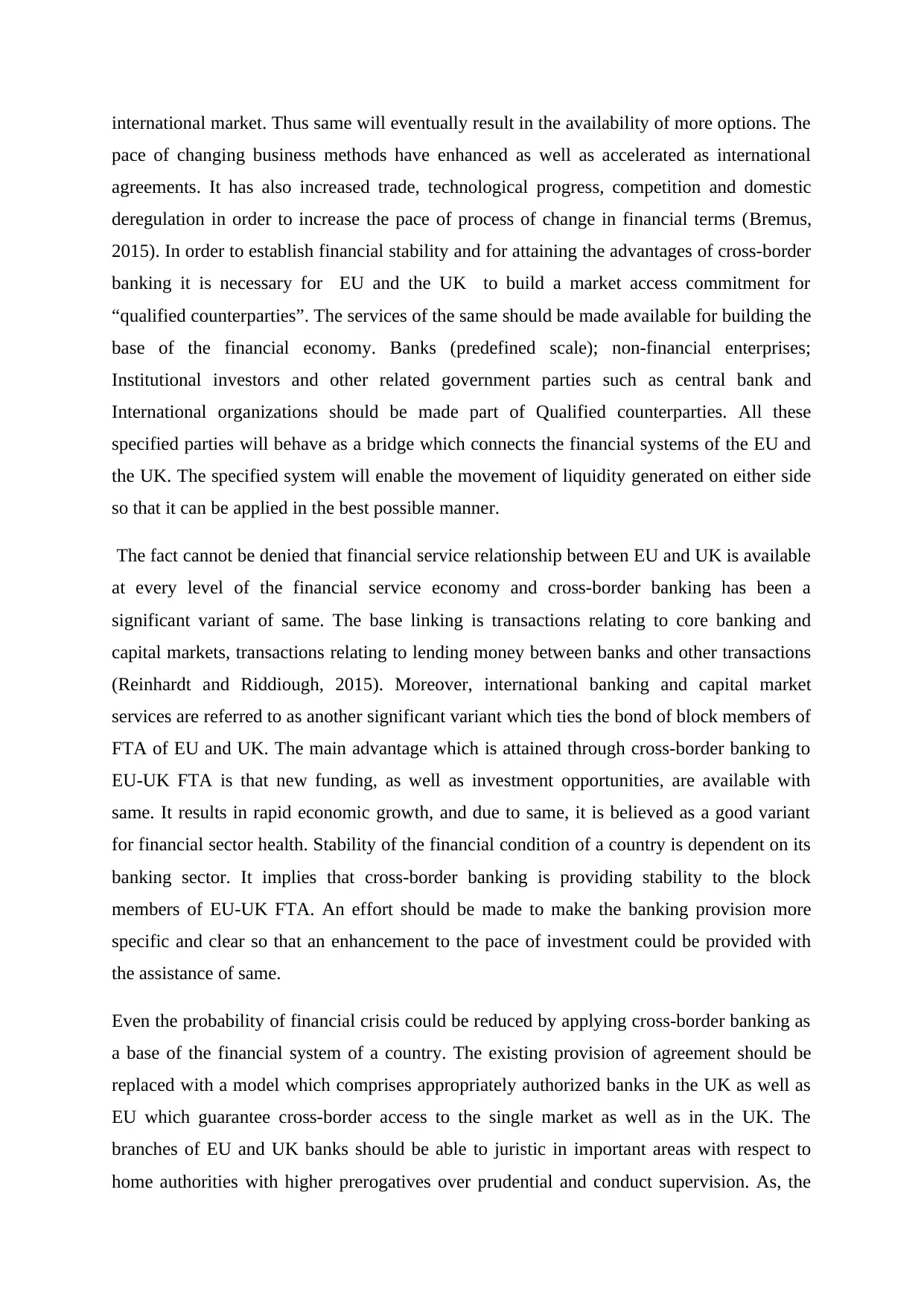
international market. Thus same will eventually result in the availability of more options. The
pace of changing business methods have enhanced as well as accelerated as international
agreements. It has also increased trade, technological progress, competition and domestic
deregulation in order to increase the pace of process of change in financial terms (Bremus,
2015). In order to establish financial stability and for attaining the advantages of cross-border
banking it is necessary for EU and the UK to build a market access commitment for
“qualified counterparties”. The services of the same should be made available for building the
base of the financial economy. Banks (predefined scale); non-financial enterprises;
Institutional investors and other related government parties such as central bank and
International organizations should be made part of Qualified counterparties. All these
specified parties will behave as a bridge which connects the financial systems of the EU and
the UK. The specified system will enable the movement of liquidity generated on either side
so that it can be applied in the best possible manner.
The fact cannot be denied that financial service relationship between EU and UK is available
at every level of the financial service economy and cross-border banking has been a
significant variant of same. The base linking is transactions relating to core banking and
capital markets, transactions relating to lending money between banks and other transactions
(Reinhardt and Riddiough, 2015). Moreover, international banking and capital market
services are referred to as another significant variant which ties the bond of block members of
FTA of EU and UK. The main advantage which is attained through cross-border banking to
EU-UK FTA is that new funding, as well as investment opportunities, are available with
same. It results in rapid economic growth, and due to same, it is believed as a good variant
for financial sector health. Stability of the financial condition of a country is dependent on its
banking sector. It implies that cross-border banking is providing stability to the block
members of EU-UK FTA. An effort should be made to make the banking provision more
specific and clear so that an enhancement to the pace of investment could be provided with
the assistance of same.
Even the probability of financial crisis could be reduced by applying cross-border banking as
a base of the financial system of a country. The existing provision of agreement should be
replaced with a model which comprises appropriately authorized banks in the UK as well as
EU which guarantee cross-border access to the single market as well as in the UK. The
branches of EU and UK banks should be able to juristic in important areas with respect to
home authorities with higher prerogatives over prudential and conduct supervision. As, the
pace of changing business methods have enhanced as well as accelerated as international
agreements. It has also increased trade, technological progress, competition and domestic
deregulation in order to increase the pace of process of change in financial terms (Bremus,
2015). In order to establish financial stability and for attaining the advantages of cross-border
banking it is necessary for EU and the UK to build a market access commitment for
“qualified counterparties”. The services of the same should be made available for building the
base of the financial economy. Banks (predefined scale); non-financial enterprises;
Institutional investors and other related government parties such as central bank and
International organizations should be made part of Qualified counterparties. All these
specified parties will behave as a bridge which connects the financial systems of the EU and
the UK. The specified system will enable the movement of liquidity generated on either side
so that it can be applied in the best possible manner.
The fact cannot be denied that financial service relationship between EU and UK is available
at every level of the financial service economy and cross-border banking has been a
significant variant of same. The base linking is transactions relating to core banking and
capital markets, transactions relating to lending money between banks and other transactions
(Reinhardt and Riddiough, 2015). Moreover, international banking and capital market
services are referred to as another significant variant which ties the bond of block members of
FTA of EU and UK. The main advantage which is attained through cross-border banking to
EU-UK FTA is that new funding, as well as investment opportunities, are available with
same. It results in rapid economic growth, and due to same, it is believed as a good variant
for financial sector health. Stability of the financial condition of a country is dependent on its
banking sector. It implies that cross-border banking is providing stability to the block
members of EU-UK FTA. An effort should be made to make the banking provision more
specific and clear so that an enhancement to the pace of investment could be provided with
the assistance of same.
Even the probability of financial crisis could be reduced by applying cross-border banking as
a base of the financial system of a country. The existing provision of agreement should be
replaced with a model which comprises appropriately authorized banks in the UK as well as
EU which guarantee cross-border access to the single market as well as in the UK. The
branches of EU and UK banks should be able to juristic in important areas with respect to
home authorities with higher prerogatives over prudential and conduct supervision. As, the
Paraphrase This Document
Need a fresh take? Get an instant paraphrase of this document with our AI Paraphraser
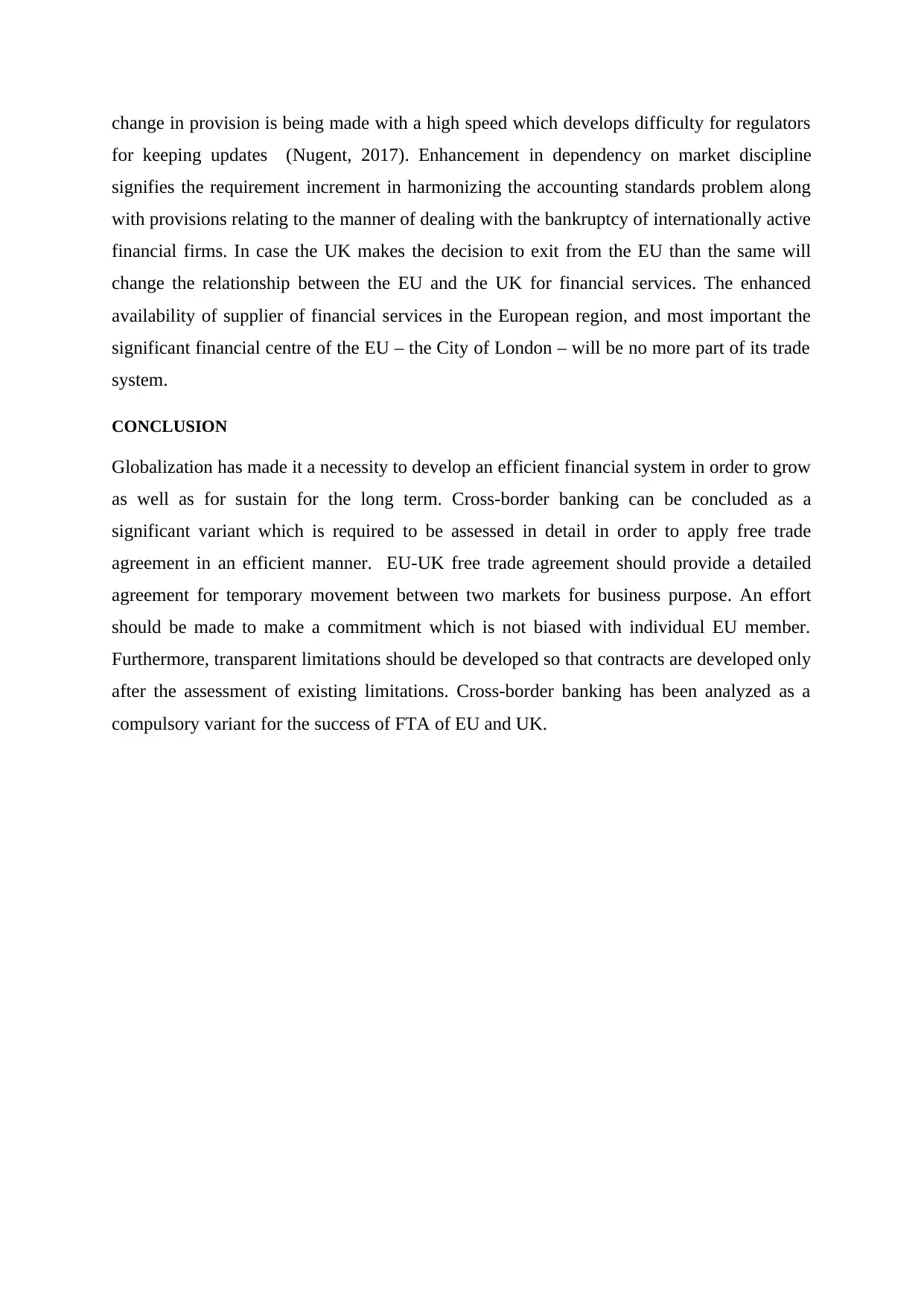
change in provision is being made with a high speed which develops difficulty for regulators
for keeping updates (Nugent, 2017). Enhancement in dependency on market discipline
signifies the requirement increment in harmonizing the accounting standards problem along
with provisions relating to the manner of dealing with the bankruptcy of internationally active
financial firms. In case the UK makes the decision to exit from the EU than the same will
change the relationship between the EU and the UK for financial services. The enhanced
availability of supplier of financial services in the European region, and most important the
significant financial centre of the EU – the City of London – will be no more part of its trade
system.
CONCLUSION
Globalization has made it a necessity to develop an efficient financial system in order to grow
as well as for sustain for the long term. Cross-border banking can be concluded as a
significant variant which is required to be assessed in detail in order to apply free trade
agreement in an efficient manner. EU-UK free trade agreement should provide a detailed
agreement for temporary movement between two markets for business purpose. An effort
should be made to make a commitment which is not biased with individual EU member.
Furthermore, transparent limitations should be developed so that contracts are developed only
after the assessment of existing limitations. Cross-border banking has been analyzed as a
compulsory variant for the success of FTA of EU and UK.
for keeping updates (Nugent, 2017). Enhancement in dependency on market discipline
signifies the requirement increment in harmonizing the accounting standards problem along
with provisions relating to the manner of dealing with the bankruptcy of internationally active
financial firms. In case the UK makes the decision to exit from the EU than the same will
change the relationship between the EU and the UK for financial services. The enhanced
availability of supplier of financial services in the European region, and most important the
significant financial centre of the EU – the City of London – will be no more part of its trade
system.
CONCLUSION
Globalization has made it a necessity to develop an efficient financial system in order to grow
as well as for sustain for the long term. Cross-border banking can be concluded as a
significant variant which is required to be assessed in detail in order to apply free trade
agreement in an efficient manner. EU-UK free trade agreement should provide a detailed
agreement for temporary movement between two markets for business purpose. An effort
should be made to make a commitment which is not biased with individual EU member.
Furthermore, transparent limitations should be developed so that contracts are developed only
after the assessment of existing limitations. Cross-border banking has been analyzed as a
compulsory variant for the success of FTA of EU and UK.
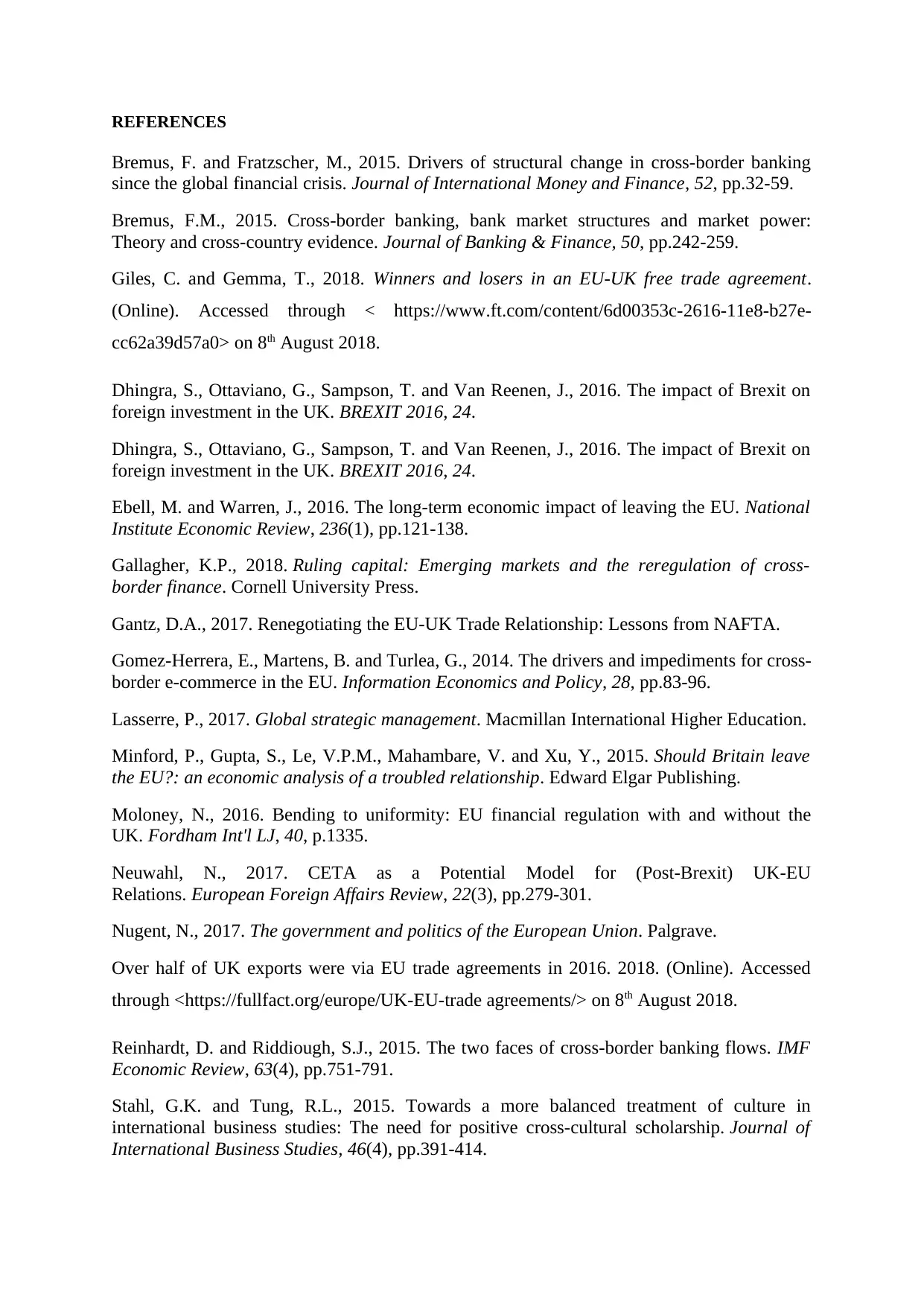
REFERENCES
Bremus, F. and Fratzscher, M., 2015. Drivers of structural change in cross-border banking
since the global financial crisis. Journal of International Money and Finance, 52, pp.32-59.
Bremus, F.M., 2015. Cross-border banking, bank market structures and market power:
Theory and cross-country evidence. Journal of Banking & Finance, 50, pp.242-259.
Giles, C. and Gemma, T., 2018. Winners and losers in an EU-UK free trade agreement.
(Online). Accessed through < https://www.ft.com/content/6d00353c-2616-11e8-b27e-
cc62a39d57a0> on 8th August 2018.
Dhingra, S., Ottaviano, G., Sampson, T. and Van Reenen, J., 2016. The impact of Brexit on
foreign investment in the UK. BREXIT 2016, 24.
Dhingra, S., Ottaviano, G., Sampson, T. and Van Reenen, J., 2016. The impact of Brexit on
foreign investment in the UK. BREXIT 2016, 24.
Ebell, M. and Warren, J., 2016. The long-term economic impact of leaving the EU. National
Institute Economic Review, 236(1), pp.121-138.
Gallagher, K.P., 2018. Ruling capital: Emerging markets and the reregulation of cross-
border finance. Cornell University Press.
Gantz, D.A., 2017. Renegotiating the EU-UK Trade Relationship: Lessons from NAFTA.
Gomez-Herrera, E., Martens, B. and Turlea, G., 2014. The drivers and impediments for cross-
border e-commerce in the EU. Information Economics and Policy, 28, pp.83-96.
Lasserre, P., 2017. Global strategic management. Macmillan International Higher Education.
Minford, P., Gupta, S., Le, V.P.M., Mahambare, V. and Xu, Y., 2015. Should Britain leave
the EU?: an economic analysis of a troubled relationship. Edward Elgar Publishing.
Moloney, N., 2016. Bending to uniformity: EU financial regulation with and without the
UK. Fordham Int'l LJ, 40, p.1335.
Neuwahl, N., 2017. CETA as a Potential Model for (Post-Brexit) UK-EU
Relations. European Foreign Affairs Review, 22(3), pp.279-301.
Nugent, N., 2017. The government and politics of the European Union. Palgrave.
Over half of UK exports were via EU trade agreements in 2016. 2018. (Online). Accessed
through <https://fullfact.org/europe/UK-EU-trade agreements/> on 8th August 2018.
Reinhardt, D. and Riddiough, S.J., 2015. The two faces of cross-border banking flows. IMF
Economic Review, 63(4), pp.751-791.
Stahl, G.K. and Tung, R.L., 2015. Towards a more balanced treatment of culture in
international business studies: The need for positive cross-cultural scholarship. Journal of
International Business Studies, 46(4), pp.391-414.
Bremus, F. and Fratzscher, M., 2015. Drivers of structural change in cross-border banking
since the global financial crisis. Journal of International Money and Finance, 52, pp.32-59.
Bremus, F.M., 2015. Cross-border banking, bank market structures and market power:
Theory and cross-country evidence. Journal of Banking & Finance, 50, pp.242-259.
Giles, C. and Gemma, T., 2018. Winners and losers in an EU-UK free trade agreement.
(Online). Accessed through < https://www.ft.com/content/6d00353c-2616-11e8-b27e-
cc62a39d57a0> on 8th August 2018.
Dhingra, S., Ottaviano, G., Sampson, T. and Van Reenen, J., 2016. The impact of Brexit on
foreign investment in the UK. BREXIT 2016, 24.
Dhingra, S., Ottaviano, G., Sampson, T. and Van Reenen, J., 2016. The impact of Brexit on
foreign investment in the UK. BREXIT 2016, 24.
Ebell, M. and Warren, J., 2016. The long-term economic impact of leaving the EU. National
Institute Economic Review, 236(1), pp.121-138.
Gallagher, K.P., 2018. Ruling capital: Emerging markets and the reregulation of cross-
border finance. Cornell University Press.
Gantz, D.A., 2017. Renegotiating the EU-UK Trade Relationship: Lessons from NAFTA.
Gomez-Herrera, E., Martens, B. and Turlea, G., 2014. The drivers and impediments for cross-
border e-commerce in the EU. Information Economics and Policy, 28, pp.83-96.
Lasserre, P., 2017. Global strategic management. Macmillan International Higher Education.
Minford, P., Gupta, S., Le, V.P.M., Mahambare, V. and Xu, Y., 2015. Should Britain leave
the EU?: an economic analysis of a troubled relationship. Edward Elgar Publishing.
Moloney, N., 2016. Bending to uniformity: EU financial regulation with and without the
UK. Fordham Int'l LJ, 40, p.1335.
Neuwahl, N., 2017. CETA as a Potential Model for (Post-Brexit) UK-EU
Relations. European Foreign Affairs Review, 22(3), pp.279-301.
Nugent, N., 2017. The government and politics of the European Union. Palgrave.
Over half of UK exports were via EU trade agreements in 2016. 2018. (Online). Accessed
through <https://fullfact.org/europe/UK-EU-trade agreements/> on 8th August 2018.
Reinhardt, D. and Riddiough, S.J., 2015. The two faces of cross-border banking flows. IMF
Economic Review, 63(4), pp.751-791.
Stahl, G.K. and Tung, R.L., 2015. Towards a more balanced treatment of culture in
international business studies: The need for positive cross-cultural scholarship. Journal of
International Business Studies, 46(4), pp.391-414.
1 out of 9
Related Documents
Your All-in-One AI-Powered Toolkit for Academic Success.
+13062052269
info@desklib.com
Available 24*7 on WhatsApp / Email
![[object Object]](/_next/static/media/star-bottom.7253800d.svg)
Unlock your academic potential
© 2024 | Zucol Services PVT LTD | All rights reserved.





